Overview
- Brief Narrative
- Handmade white embroidered apron with a floral design sewn for Herta Griffel by her mother Beila, in Vienna, Austria before Herta’s emigration in 1940. Herta was a young girl living in Vienna, Austria, with her parents, Wolf and Beila Nagel Griffel when Germany annexed Austria in the Anschluss on March 13, 1938. German authorities quickly created new legislation that restricted Jewish life. On November 9-10, during the Kristallnacht pogrom, Wolf and Beila’s grocery store was taken from them and Wolf was forced into compulsory labor. Every morning a truck took him and the other men in the neighborhood to a labor camp, and then brought them home at night. The forced labor complicated Wolf’s existing health issues and one day after coming home, he died. After Kristallnacht, Beila arranged for Herta to immigrate to the United States through the German Jewish Children’s Aid Society. On November 23, 1940, Herta left Vienna with eight other children and a chaperone, and arrived in Jersey City, New Jersey, on December 23. Herta lived with the Baer family for six months and then was placed with the Friedlander family until adulthood. On September 14, 1942, Herta’s mother, Beila was deported from Vienna to Maly Trostinec concentration camp in Belorussia where she was murdered on September 18.
- Date
-
emigration:
1940 November 23
- Geography
-
creation:
Vienna (Austria)
en route: Lisbon (Portugal)
use: Baltimore (Md.)
- Credit Line
- United States Holocaust Memorial Museum Collection, Gift of Herta Griffel Baitch, in memory of her parents, Wolf Griffel and Beila Bertha Nagel Griffel
- Markings
- front, interior right waistband, stitched, red thread : H.G.
- Contributor
-
Subject:
Herta Baitch
- Biography
-
Herta Griffel (b. 1933, later Herta Baitch) was born in Vienna, Austria, to Wolf (1888-1939) and Beila Nagel Griffel (1896-1942). Wolf was born in Krakow, Austria-Hungary, and Beila was from Majdan Średni, Kingdom of Poland, which was part of the Russian Empire. Both areas were integrated into Poland when the nation was created in the aftermath of WWI. Wolf and Beila moved to Vienna, were married in April 1930, and established a small grocery store. The family spoke German and Yiddish at home. Beila enjoyed sewing and embroidery, and Wolf loved to sing Yiddish songs with Herta from a songbook. Wolf had minor health issues, but Beila was able to manage the store and take care of her young daughter and husband when needed.
On March 13, 1938, Austria was annexed into Germany, in what became known as the Anschluss. German authorities quickly created new legislation that restricted Jewish life. Jews were excluded from most professions and were forced to wear a yellow badge to identify themselves as Jews. On November 9-10, during the Kristallnacht pogrom, Jews and their businesses, homes, and places of worship were freely and openly attacked by the public and Nazi paramilitary units. Wolf and Beila’s grocery store was confiscated and Wolf was forced into compulsory labor. Every morning a truck took him and the other men in the neighborhood to a labor camp and brought them home at night. Wolf and Beila discussed the possibility of Wolf escaping to Shanghai, but those plans never came to fruition. The forced labor complicated Wolf’s health issues and one day after coming home, he died. After the loss of Wolf and the store, Beila and Herta moved in with Beila’s sister-in-law, Leah Nagel.
After Kristallnacht, the Chief Rabbi of Vienna, Rabbi Mermelstein, sought to get as many children out of Vienna as he could. He began working with the German Jewish Children’s Aid Society, an American organization that helped resettle Jewish children in the United States. Biela was able to get Herta on the list of thirty five children who were selected for possible resettlement and sent to a doctor for a preliminary exam. The children were selected based on two criteria: their fathers had died in camps and their mothers were ineligible for immigration because America’s Hungarian, Romanian, and Polish immigration quotas were already filled. Because Beila was originally from Poland, she fell under the Polish quota. Herta and eight other children passed the exam and were allowed to emigrate from Germany. On November 23, 1940, Herta and the rest of the children said goodbye to their parents, joined their chaperone, Margaret Feiler, and took a train from Vienna to Berlin. Herta was only seven and was the youngest of the children. The rest were between thirteen and seventeen and helped take care of and comfort her along the journey. The group was forced to stay in a shelter for the night because of an Allied night raid. The group then took another train to Lisbon, Portugal, where they stayed for twelve days before boarding the SS Excambion for the United States. Herta and the rest of the children arrived in Jersey City, New Jersey, on December 23. Upon arrival, they stayed in a temporary home. Later, Rose Beser, Herta’s new social worker came and brought her to the Baer family in Baltimore, Maryland. Upon arrival in her new foster home, Clara and Joseph (Joe) Baer greeted Herta in Yiddish, which comforted her.
While living with the Baers, Herta exchanged letters with her mother, who hoped to reunite with her daughter in America. Beila’s letters stopped arriving in 1941. Beila was deported from Vienna, on September 14, 1942, on Transport 41, Train Da 227. Her prisoner transport number was 679. Beila was taken to Maly Trostinec concentration camp in Belorussia where she was murdered on September 18, 1942. Herta did not learn of her mother’s fate until 2004.
In July 1941, Herta’s foster mother, Clara unexpectedly gave birth to another child and Ms. Beser felt it would be better if Herta lived with another family. She was removed from the Baer’s care and placed with Harry and Mary Friedlander and their adopted daughter, Beverly. Herta lived with the Friedlanders until 1952 when she married Arthur Baitch. In 1965 Herta’s maternal relative Adela Dula managed to get in touch with her, and she returned a package Beila had entrusted to her for Herta including a tablecloth, candlesticks, silverware, and jewelry. Herta and Arthur remain married with three children and seven grandchildren.
Physical Details
- Classification
-
Dress Accessories
- Category
-
Protective wear
- Object Type
-
Aprons (lcsh)
- Genre/Form
- Dresses.
- Physical Description
- White cotton, handmade waist apron with a ruffled design and an embroidered floral pattern. The top of the skirt fabric is gathered and smocked at the waistband and widens as it extends down. Two hemmed waist ties, approximately 29 inched in length, with hemmed edges extend out from the apron’s waistband. The ends of the waist ties are folded to a point and each has a satin stitched flower. The bottom of the apron has two pleats forming three tiers, each with a row of satin stitched, repeating red and blue flowers with green leaves. A white tag with red stitched initials is inside on the right side of the waistband. The apron is yellowed and is heavily stained throughout.
- Dimensions
- overall: Height: 14.250 inches (36.195 cm) | Width: 26.625 inches (67.628 cm)
- Materials
- overall : cotton, thread
Rights & Restrictions
- Conditions on Access
- No restrictions on access
- Conditions on Use
- No restrictions on use
Keywords & Subjects
- Topical Term
- Child refugees--Austria. Holocaust survivors--United States. Jewish children in the Holocaust. World War (1939-1945)--Refugees. Emigration and immigration--United States--20th century. Emigration and immigration--Austria--20th century. Holocaust, Jewish (1939-1945)--Austria.
- Geographic Name
- Vienna (Austria) Lisbon (Portugal) Berlin (Germany) Baltimore (Maryland)
- Personal Name
- Murmelstein, Benjamin, 1905-1989.
- Corporate Name
- German-Jewish Children's Aid (Organization)
Administrative Notes
- Legal Status
- Permanent Collection
- Provenance
- The apron was donated to the United States Holocaust Memorial Museum in 2016 by Herta Griffel Baitch.
- Record last modified:
- 2023-03-02 08:30:12
- This page:
- https://collections.ushmm.org/search/catalog/irn539508
Download & Licensing
In-Person Research
- By Appointment
- Request 21 Days in Advance of Visit
- Plan a Research Visit
- Request to See This Object
Contact Us
Also in Herta Griffel Baitch collection
The collection consists of children’s clothing, a suitcase, a doll, a siddur, a pair of earrings, correspondence, documents, a notebook, and a photograph relating to the experiences of Herta Griffel Baitch and her parents in Vienna, Austria, before and during the Holocaust, and of Herta in the United States following her immigration in November 1940.
Date: approximately 1938-2008
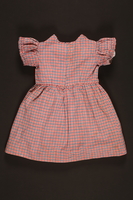
Checkered dress with heart patches made for a young Austrian Jewish refugee before her emigration
Object
Girls dress handmade from checkered fabric with decorative heart shaped elements on the front sewn for Herta Griffel by her mother Beila, in Vienna, Austria before Herta’s emigration in 1940. Herta was a young girl living in Vienna, Austria, with her parents, Wolf and Beila Nagel Griffel when Germany annexed Austria in the Anschluss on March 13, 1938. German authorities quickly created new legislation that restricted Jewish life. On November 9-10, during the Kristallnacht pogrom, Wolf and Beila’s grocery store was taken from them and Wolf was forced into compulsory labor. Every morning a truck took him and the other men in the neighborhood to a labor camp, and then brought them home at night. The forced labor complicated Wolf’s existing health issues and one day after coming home, he died. After Kristallnacht, Beila arranged for Herta to immigrate to the United States through the German Jewish Children’s Aid Society. On November 23, 1940, Herta left Vienna with eight other children and a chaperone, and arrived in Jersey City, New Jersey, on December 23. Herta lived with the Baer family for six months and then was placed with the Friedlander family until adulthood. On September 14, 1942, Herta’s mother, Beila was deported from Vienna to Maly Trostinec concentration camp in Belorussia where she was murdered on September 18.
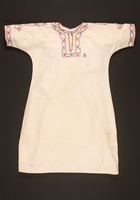
Nightgown with floral embroidery made for a young Austrian Jewish refugee before emigration
Object
Handmade white nightgown with embroidered flowers sewn for Herta Griffel by her mother Beila, in Vienna, Austria before Herta’s emigration in 1940. Herta was a young girl living in Vienna, Austria, with her parents, Wolf and Beila Nagel Griffel when Germany annexed Austria in the Anschluss on March 13, 1938. German authorities quickly created new legislation that restricted Jewish life. On November 9-10, during the Kristallnacht pogrom, Wolf and Beila’s grocery store was taken from them and Wolf was forced into compulsory labor. Every morning a truck took him and the other men in the neighborhood to a labor camp, and then brought them home at night. The forced labor complicated Wolf’s existing health issues and one day after coming home, he died. After Kristallnacht, Beila arranged for Herta to immigrate to the United States through the German Jewish Children’s Aid Society. On November 23, 1940, Herta left Vienna with eight other children and a chaperone, and arrived in Jersey City, New Jersey, on December 23. Herta lived with the Baer family for six months and then was placed with the Friedlander family until adulthood. On September 14, 1942, Herta’s mother, Beila was deported from Vienna to Maly Trostinec concentration camp in Belorussia where she was murdered on September 18.
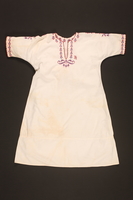
Embroidered nightgown made for a young Austrian Jewish refugee before her emigration
Object
Handmade white nightgown with an embroidered geometric design sewn for Herta Griffel by her mother Beila, in Vienna, Austria before Herta’s emigration in 1940. Herta was a young girl living in Vienna, Austria, with her parents, Wolf and Beila Nagel Griffel when Germany annexed Austria in the Anschluss on March 13, 1938. German authorities quickly created new legislation that restricted Jewish life. On November 9-10, during the Kristallnacht pogrom, Wolf and Beila’s grocery store was taken from them and Wolf was forced into compulsory labor. Every morning a truck took him and the other men in the neighborhood to a labor camp, and then brought them home at night. The forced labor complicated Wolf’s existing health issues and one day after coming home, he died. After Kristallnacht, Beila arranged for Herta to immigrate to the United States through the German Jewish Children’s Aid Society. On November 23, 1940, Herta left Vienna with eight other children and a chaperone, and arrived in Jersey City, New Jersey, on December 23. Herta lived with the Baer family for six months and then was placed with the Friedlander family until adulthood. On September 14, 1942, Herta’s mother, Beila was deported from Vienna to Maly Trostinec concentration camp in Belorussia where she was murdered on September 18.
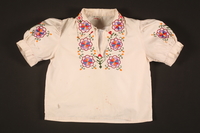
Embroidered blouse made for a young Austrian Jewish refugee before her emigration
Object
Handmade white blouse with a kaleidoscopic embroidered design sewn for Herta Griffel by her mother Beila, in Vienna, Austria, before Herta’s emigration in 1940. Herta was a young girl living in Vienna, Austria, with her parents, Wolf and Beila Nagel Griffel when Germany annexed Austria in the Anschluss on March 13, 1938. German authorities quickly created new legislation that restricted Jewish life. On November 9-10, during the Kristallnacht pogrom, Wolf and Beila’s grocery store was taken from them and Wolf was forced into compulsory labor. Every morning a truck took him and the other men in the neighborhood to a labor camp, and then brought them home at night. The forced labor complicated Wolf’s existing health issues and one day after coming home, he died. After Kristallnacht, Beila arranged for Herta to immigrate to the United States through the German Jewish Children’s Aid Society. On November 23, 1940, Herta left Vienna with eight other children and a chaperone, and arrived in Jersey City, New Jersey, on December 23. Herta lived with the Baer family for six months and then was placed with the Friedlander family until adulthood. On September 14, 1942, Herta’s mother, Beila was deported from Vienna to Maly Trostinec concentration camp in Belorussia where she was murdered on September 18.
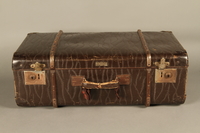
Large suitcase with a broken handle used by a young Austrian Jewish refugee during emigration
Object
Large rectangular suitcase used by Herta Griffel when she emigrated from Vienna, Austria to the United States in 1940. Herta was a young girl living in Vienna, Austria, with her parents, Wolf and Beila Nagel Griffel when Germany annexed Austria in the Anschluss on March 13, 1938. German authorities quickly created new legislation that restricted Jewish life. On November 9-10, during the Kristallnacht pogrom, Wolf and Beila’s grocery store was taken from them and Wolf was forced into compulsory labor. Every morning a truck took him and the other men in the neighborhood to a labor camp, and then brought them home at night. The forced labor complicated Wolf’s existing health issues and one day after coming home, he died. After Kristallnacht, Beila arranged for Herta to immigrate to the United States through the German Jewish Children’s Aid Society. On November 23, 1940, Herta left Vienna with eight other children and a chaperone, and arrived in Jersey City, New Jersey, on December 23. Herta lived with the Baer family for six months and then was placed with the Friedlander family until adulthood. On September 14, 1942, Herta’s mother, Beila was deported from Vienna to Maly Trostinec concentration camp in Belorussia where she was murdered on September 18.
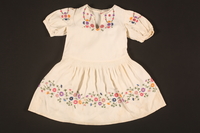
Embroidered dress made for a young Austrian Jewish refugee before her emigration
Object
Girls handmade white dress with a colorful embroidered design sewn for Herta Griffel by her mother Beila, in Vienna, Austria before Herta’s emigration in 1940. Herta was a young girl living in Vienna, Austria, with her parents, Wolf and Beila Nagel Griffel when Germany annexed Austria in the Anschluss on March 13, 1938. German authorities quickly created new legislation that restricted Jewish life. On November 9-10, during the Kristallnacht pogrom, Wolf and Beila’s grocery store was taken from them and Wolf was forced into compulsory labor. Every morning a truck took him and the other men in the neighborhood to a labor camp, and then brought them home at night. The forced labor complicated Wolf’s existing health issues and one day after coming home, he died. After Kristallnacht, Beila arranged for Herta to immigrate to the United States through the German Jewish Children’s Aid Society. On November 23, 1940, Herta left Vienna with eight other children and a chaperone, and arrived in Jersey City, New Jersey, on December 23. Herta lived with the Baer family for six months and then was placed with the Friedlander family until adulthood. On September 14, 1942, Herta’s mother, Beila was deported from Vienna to Maly Trostinec concentration camp in Belorussia where she was murdered on September 18.
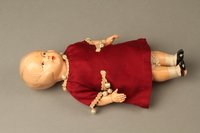
Plastic doll with a burgundy dress brought with a young Austrian Jewish refugee
Object
Plastic doll wearing a handmade burgundy dress brought with Herta Griffel from Vienna, Austria to the United States in 1940. The dress and the undergarment on the doll were handmade by Herta's mother. Herta was a young girl living in Vienna, Austria, with her parents, Wolf and Beila Nagel Griffel when Germany annexed Austria in the Anschluss on March 13, 1938. German authorities quickly created new legislation that restricted Jewish life. On November 9-10, during the Kristallnacht pogrom, Wolf and Beila’s grocery store was taken from them and Wolf was forced into compulsory labor. Every morning a truck took him and the other men in the neighborhood to a labor camp, and then brought them home at night. The forced labor complicated Wolf’s existing health issues and one day after coming home, he died. After Kristallnacht, Beila arranged for Herta to immigrate to the United States through the German Jewish Children’s Aid Society. On November 23, 1940, Herta left Vienna with eight other children and a chaperone, and arrived in Jersey City, New Jersey, on December 23. Herta lived with the Baer family for six months and then was placed with the Friedlander family until adulthood. On September 14, 1942, Herta’s mother, Beila was deported from Vienna to Maly Trostinec concentration camp in Belorussia where she was murdered on September 18.
Siddur given as a gift to a young Austrian Jewish refugee girl before her emigration
Object
Jewish Siddur given to Herta Griffel by her teacher Gertrud Winter in 1940 before Herta’s emigration from Austria. Herta was a young girl living in Vienna, Austria with her parents, Wolf and Beila Nagel Griffel when Germany annexed Austria in the Anschluss on March 13, 1938. German authorities quickly created new legislation that restricted Jewish life. On November 9 -10, during the Kristallnacht pogrom, Wolf and Beila’s grocery store was taken from them and Wolf was forced into compulsory labor. Every morning a truck took him and the other men in the neighborhood to a labor camp, and then brought them home at night. The forced labor complicated Wolf’s existing health issues and one day after coming home, he died. After Kristallnacht, Beila arranged for Herta to immigrate to the United States through the German Jewish Children’s Aid Society. On November 23, 1940 Herta left Vienna with eight other children and a chaperone and arrived in Jersey City, New Jersey, on December 23. Herta lived with the Baer family for six months, and then was placed with the Friedlander family until adulthood. On September 14, 1942, Herta’s mother Beila was deported from Vienna to Maly Trostinec concentration camp in Belorussia where she was murdered on September 18. Gertrud was deported from Vienna to Theresienstadt ghetto labor camp in German occupied Czechoslovakia, on September 24, 1942. On October 23, 1944, she was deported to Auschwitz Birkenau killing center in German occupied Poland, where she was murdered upon arrival.

Reunion of Herta Baitch and Stella Bruckenstein Bengel
Oral History
Herta Baitch and Stella Bruckenstein discuss life in the Jewish community in Vienna in the prewar and wartime period; Stella's memories of Herta's parents and family, and Herta's journey to the United States in 1940.
Herta Griffel Baitch papers
Document
The Herta Griffel Baitch papers include Herta Griffel’s German passport and Viennese birth certificate, two letters from her mother to Herta’s social worker (Rose Beser), a notebook containing handwritten Yiddish songs and proverbs Herta’s mother copied for her in German, and a photograph of Herta and her mother before the Holocaust. Later photographs depict Herta with her cousin Adela Dula in London in 1977 and visiting the Israelitische Kultusgemeinde in 2008. The papers also include letters from Adela to Herta and her first foster parents (Clara and Joseph Baer), notes describing the family’s history, and an email from Asa Baitch about the Nagel family from Majdan Sredny.
Pair of earrings entrusted to a young Austrian Jewish refugee after her emigration
Object
A pair of brass earrings later entrusted to Herta Griffel (b. 1933) by her mother years after her emigration from Vienna, Austria to the United States in 1940. Herta was a young girl living in Vienna, Austria, with her parents, Wolf and Beila Nagel Griffel when Germany annexed Austria in the Anschluss on March 13, 1938. German authorities quickly created new legislation that restricted Jewish life. On November 9-10, during the Kristallnacht pogrom, Wolf and Beila’s grocery store was taken from them and Wolf was forced into compulsory labor. Every morning a truck took him and the other men in the neighborhood to a labor camp, and then brought them home at night. The forced labor complicated Wolf’s existing health issues and one day after coming home, he died. After Kristallnacht, Beila arranged for Herta to immigrate to the United States through the German Jewish Children’s Aid Society. On November 23, 1940, Herta left Vienna with eight other children and a chaperone, and arrived in Jersey City, New Jersey, on December 23. Herta lived with the Baer family for six months and then was placed with the Friedlander family until adulthood. On September 14, 1942, Herta’s mother, Beila was deported from Vienna to Maly Trostinec concentration camp in Belorussia where she was murdered on September 18.



